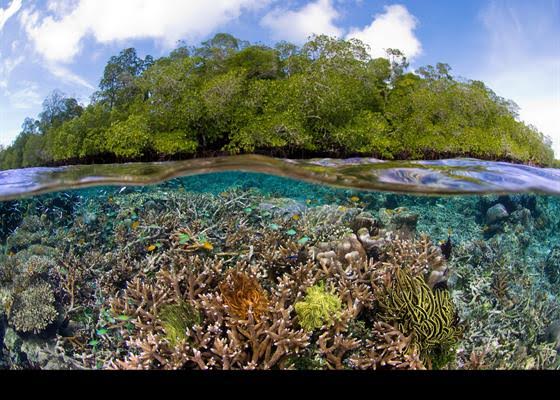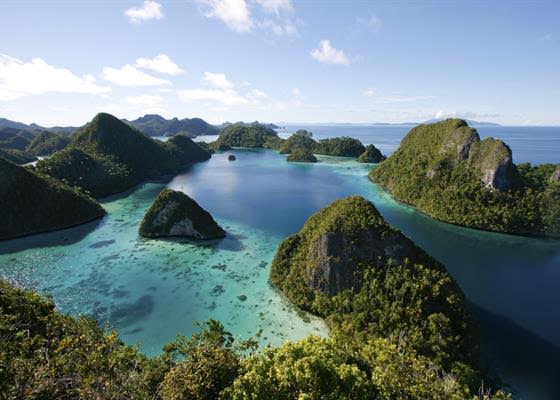
Blue Abadi Fund raises US$ 23 million to sustain Indonesia’s Bird’s Head Seascape
The Fund is uniquely designed to support local community stewardship of the protected areas of the world’s most biodiverse reefs, Indonesia’s Bird’s Head Seascape.
The announcement comes just five months after the Fund initiative was announced. Once the Fund is fully capitalized, the Seascape will contain Indonesia’s first sustainably financed marine protected area network (MPAs).
Located in West Papua, the Bird's Head Seascape encompasses more than 2,500 islands and reefs and supports thousands of species -- including 70 that can be found nowhere else on Earth.
The Blue Abadi Fund will help secure the long-term financial sustainability of the Bird’s Head Seascape by providing grants to local communities and agencies so they can sustainably manage their marine resources into the future.
 The Fund is a powerful example of how local leadership combined with coordinated global support can deliver sustained conservation goals. Founding supporters include: the Walton Family Foundation, USAID, MacArthur Foundation, Global Environment Facility and others.
The Fund is a powerful example of how local leadership combined with coordinated global support can deliver sustained conservation goals. Founding supporters include: the Walton Family Foundation, USAID, MacArthur Foundation, Global Environment Facility and others.
“These protected areas exist thanks to the support and involvement of local communities and fishermen,” said Rob Walton of the Walton Family Foundation, which has been working in the Bird’s Head region for more than a decade.
“Of course it is not enough to create marine protected areas, you have to have long-term management and enforcement. That is what the Blue Abadi fund is all about.”
The Bird’s Head Seascape coalition was launched in 2004 by Conservation International, The Nature Conservancy and World Wildlife Fund and now includes 30 conservation partners, including local and national governments, international and local NGOs, and academic institutions. Its mission is to ensure sustainable management of the Bird’s Head Seascape’s resources in a way that empowers local indigenous communities while enhancing their food security and livelihoods.
“The future of our planet depends upon the wisdom of communities,” said Peter Seligmann, chairman and CEO of Conservation International. “Through the Blue Abadi Fund the global community joins with local communities to secure the long-term health of the Bird's Head seascape, arguably the most diverse marine region of Planet Earth.”
Since the launch of the Coalition 12 years ago, the MPA Network in the Bird’s Head Seascape has grown include 3.6 million hectares of MPAs or approximately 20% of all MPAs in Indonesia. Locally managed by communities and government, the MPA Network prioritizes biodiversity conservation and sustainable local fisheries. Working together, they have reduced overfishing by outside poachers by 90 percent while enjoying growth in sustainable fisheries, food security and tourism.
Overall, the Coalition effort has engaged 30 partner organizations — including Conservation International, The Nature Conservancy, the World Wildlife Fund — and 70 donors, both local and global. The governments of Indonesia and the West Papua Province, along with local communities, have played fundamental roles in managing the MPA network and local fisheries.
The Bird’s Head Seascape Coalition will complete a full transfer of MPA management responsibilities to local communities and the government by June 2017, who will then co-manage them into the future. Local funding sources will provide 70 percent of the financing needed for the seascape, with the Indonesian government being the largest source of funding, and the Blue Abadi Fund providing the remaining 30 percent.
In a demonstration of their commitment to the MPA network and as a match to the Blue Abadi Fund, the West Papuan government has committed to provide a minimum of Rp. 7.215.000.000 (US$555,000) per year to the management of the MPA network starting in 2018. Budget allocations from the National government as well as revenues generated from tourism user fees will also contribute to the MPA costs.
“As a conservation province, our natural resources are of strategic value and importance for West Papua. To ensure that we continue to benefit from conservation, we need to work together to ensure that our MPAs are sufficiently and sustainably funded,” said Drs. Nathaniel D. Mandacan, M.Si, the Secretary General of the West Papua Provincial Government.
Local communities and agencies will use the funds to implement comprehensive management plans for the 12 MPAs that support activities such as effective patrol systems, community outreach and development, and ecological and social monitoring so management activities can be adapted over time. Funds will also be available to Papuan civil society for innovative community conservation and fishing projects, and more.
Image: Conservation.org
Support Our Journalism
We cannot do without you.. your contribution supports unbiased journalism
IBNS is not driven by any ism- not wokeism, not racism, not skewed secularism, not hyper right-wing or left liberal ideals, nor by any hardline religious beliefs or hyper nationalism. We want to serve you good old objective news, as they are. We do not judge or preach. We let people decide for themselves. We only try to present factual and well-sourced news.







